Lease Accounting Analysis and Impact
VerifiedAdded on 2020/05/16
|10
|3063
|81
AI Summary
This assignment delves into the complexities of lease accounting, examining current standards set by AASB and FASB. It analyzes the implications of these standards for financial reporting, drawing upon relevant academic literature and real-world examples. The analysis includes a case study of Pacific Star Network, exploring the impact of lease accounting changes on their reported financials.
Contribute Materials
Your contribution can guide someone’s learning journey. Share your
documents today.
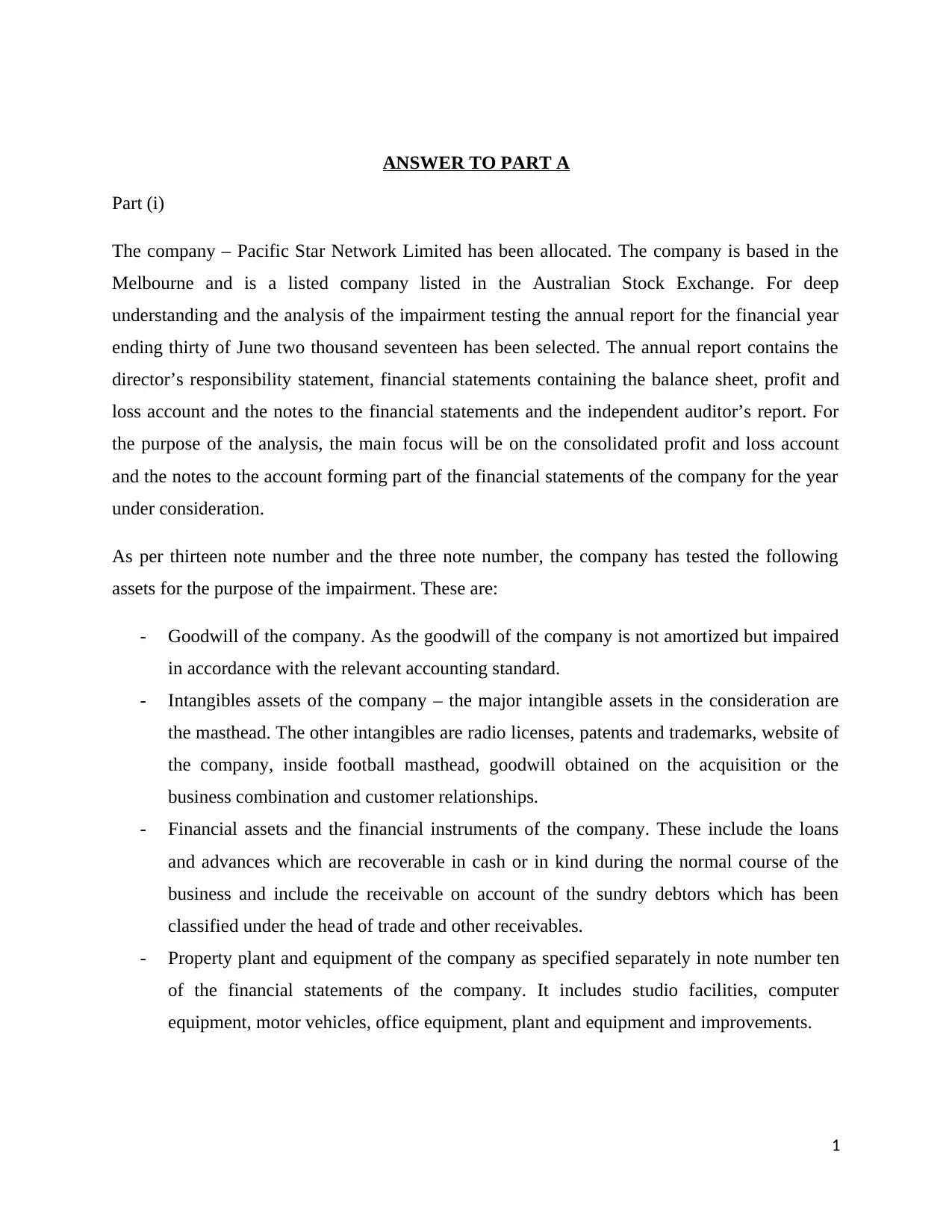
ANSWER TO PART A
Part (i)
The company – Pacific Star Network Limited has been allocated. The company is based in the
Melbourne and is a listed company listed in the Australian Stock Exchange. For deep
understanding and the analysis of the impairment testing the annual report for the financial year
ending thirty of June two thousand seventeen has been selected. The annual report contains the
director’s responsibility statement, financial statements containing the balance sheet, profit and
loss account and the notes to the financial statements and the independent auditor’s report. For
the purpose of the analysis, the main focus will be on the consolidated profit and loss account
and the notes to the account forming part of the financial statements of the company for the year
under consideration.
As per thirteen note number and the three note number, the company has tested the following
assets for the purpose of the impairment. These are:
- Goodwill of the company. As the goodwill of the company is not amortized but impaired
in accordance with the relevant accounting standard.
- Intangibles assets of the company – the major intangible assets in the consideration are
the masthead. The other intangibles are radio licenses, patents and trademarks, website of
the company, inside football masthead, goodwill obtained on the acquisition or the
business combination and customer relationships.
- Financial assets and the financial instruments of the company. These include the loans
and advances which are recoverable in cash or in kind during the normal course of the
business and include the receivable on account of the sundry debtors which has been
classified under the head of trade and other receivables.
- Property plant and equipment of the company as specified separately in note number ten
of the financial statements of the company. It includes studio facilities, computer
equipment, motor vehicles, office equipment, plant and equipment and improvements.
1
Part (i)
The company – Pacific Star Network Limited has been allocated. The company is based in the
Melbourne and is a listed company listed in the Australian Stock Exchange. For deep
understanding and the analysis of the impairment testing the annual report for the financial year
ending thirty of June two thousand seventeen has been selected. The annual report contains the
director’s responsibility statement, financial statements containing the balance sheet, profit and
loss account and the notes to the financial statements and the independent auditor’s report. For
the purpose of the analysis, the main focus will be on the consolidated profit and loss account
and the notes to the account forming part of the financial statements of the company for the year
under consideration.
As per thirteen note number and the three note number, the company has tested the following
assets for the purpose of the impairment. These are:
- Goodwill of the company. As the goodwill of the company is not amortized but impaired
in accordance with the relevant accounting standard.
- Intangibles assets of the company – the major intangible assets in the consideration are
the masthead. The other intangibles are radio licenses, patents and trademarks, website of
the company, inside football masthead, goodwill obtained on the acquisition or the
business combination and customer relationships.
- Financial assets and the financial instruments of the company. These include the loans
and advances which are recoverable in cash or in kind during the normal course of the
business and include the receivable on account of the sundry debtors which has been
classified under the head of trade and other receivables.
- Property plant and equipment of the company as specified separately in note number ten
of the financial statements of the company. It includes studio facilities, computer
equipment, motor vehicles, office equipment, plant and equipment and improvements.
1
Secure Best Marks with AI Grader
Need help grading? Try our AI Grader for instant feedback on your assignments.
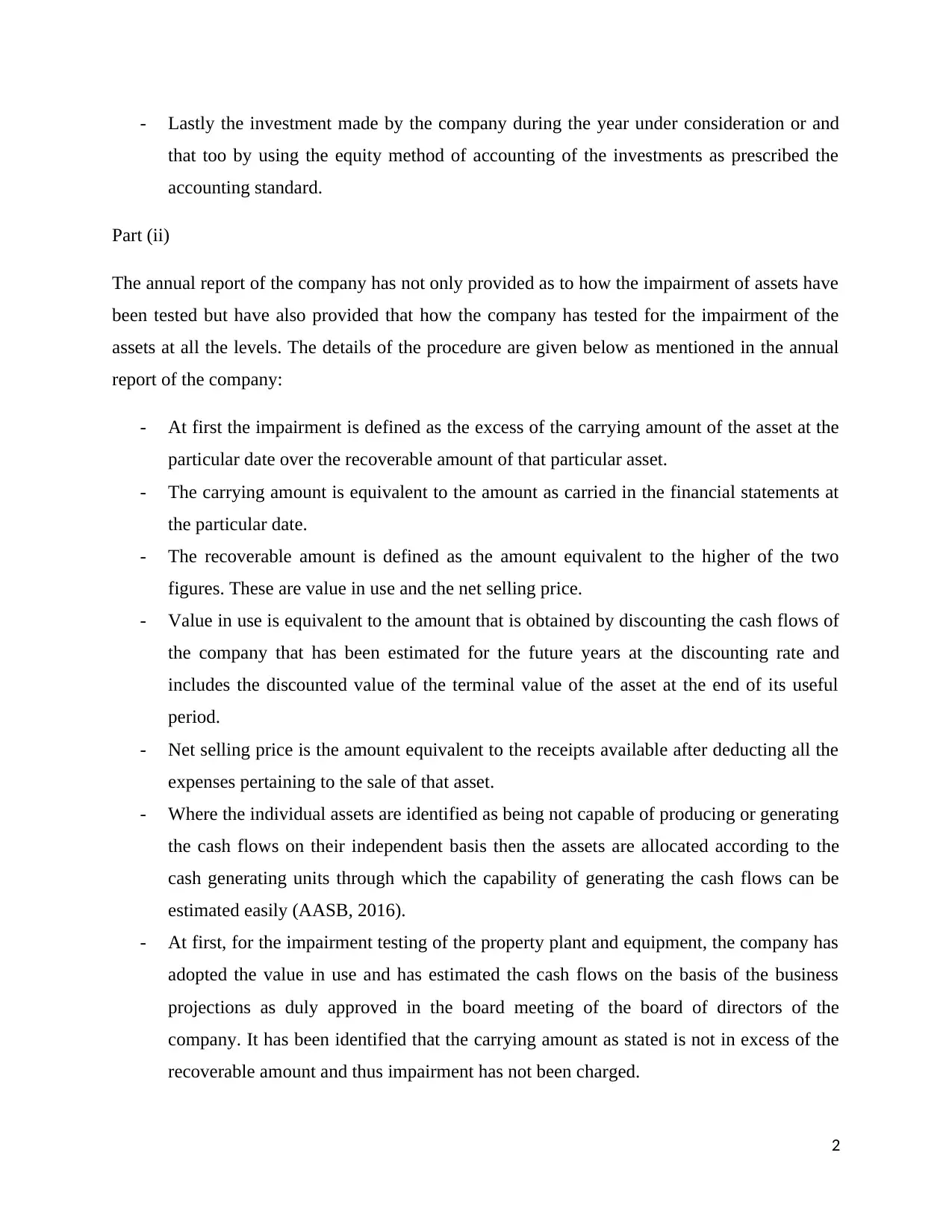
- Lastly the investment made by the company during the year under consideration or and
that too by using the equity method of accounting of the investments as prescribed the
accounting standard.
Part (ii)
The annual report of the company has not only provided as to how the impairment of assets have
been tested but have also provided that how the company has tested for the impairment of the
assets at all the levels. The details of the procedure are given below as mentioned in the annual
report of the company:
- At first the impairment is defined as the excess of the carrying amount of the asset at the
particular date over the recoverable amount of that particular asset.
- The carrying amount is equivalent to the amount as carried in the financial statements at
the particular date.
- The recoverable amount is defined as the amount equivalent to the higher of the two
figures. These are value in use and the net selling price.
- Value in use is equivalent to the amount that is obtained by discounting the cash flows of
the company that has been estimated for the future years at the discounting rate and
includes the discounted value of the terminal value of the asset at the end of its useful
period.
- Net selling price is the amount equivalent to the receipts available after deducting all the
expenses pertaining to the sale of that asset.
- Where the individual assets are identified as being not capable of producing or generating
the cash flows on their independent basis then the assets are allocated according to the
cash generating units through which the capability of generating the cash flows can be
estimated easily (AASB, 2016).
- At first, for the impairment testing of the property plant and equipment, the company has
adopted the value in use and has estimated the cash flows on the basis of the business
projections as duly approved in the board meeting of the board of directors of the
company. It has been identified that the carrying amount as stated is not in excess of the
recoverable amount and thus impairment has not been charged.
2
that too by using the equity method of accounting of the investments as prescribed the
accounting standard.
Part (ii)
The annual report of the company has not only provided as to how the impairment of assets have
been tested but have also provided that how the company has tested for the impairment of the
assets at all the levels. The details of the procedure are given below as mentioned in the annual
report of the company:
- At first the impairment is defined as the excess of the carrying amount of the asset at the
particular date over the recoverable amount of that particular asset.
- The carrying amount is equivalent to the amount as carried in the financial statements at
the particular date.
- The recoverable amount is defined as the amount equivalent to the higher of the two
figures. These are value in use and the net selling price.
- Value in use is equivalent to the amount that is obtained by discounting the cash flows of
the company that has been estimated for the future years at the discounting rate and
includes the discounted value of the terminal value of the asset at the end of its useful
period.
- Net selling price is the amount equivalent to the receipts available after deducting all the
expenses pertaining to the sale of that asset.
- Where the individual assets are identified as being not capable of producing or generating
the cash flows on their independent basis then the assets are allocated according to the
cash generating units through which the capability of generating the cash flows can be
estimated easily (AASB, 2016).
- At first, for the impairment testing of the property plant and equipment, the company has
adopted the value in use and has estimated the cash flows on the basis of the business
projections as duly approved in the board meeting of the board of directors of the
company. It has been identified that the carrying amount as stated is not in excess of the
recoverable amount and thus impairment has not been charged.
2
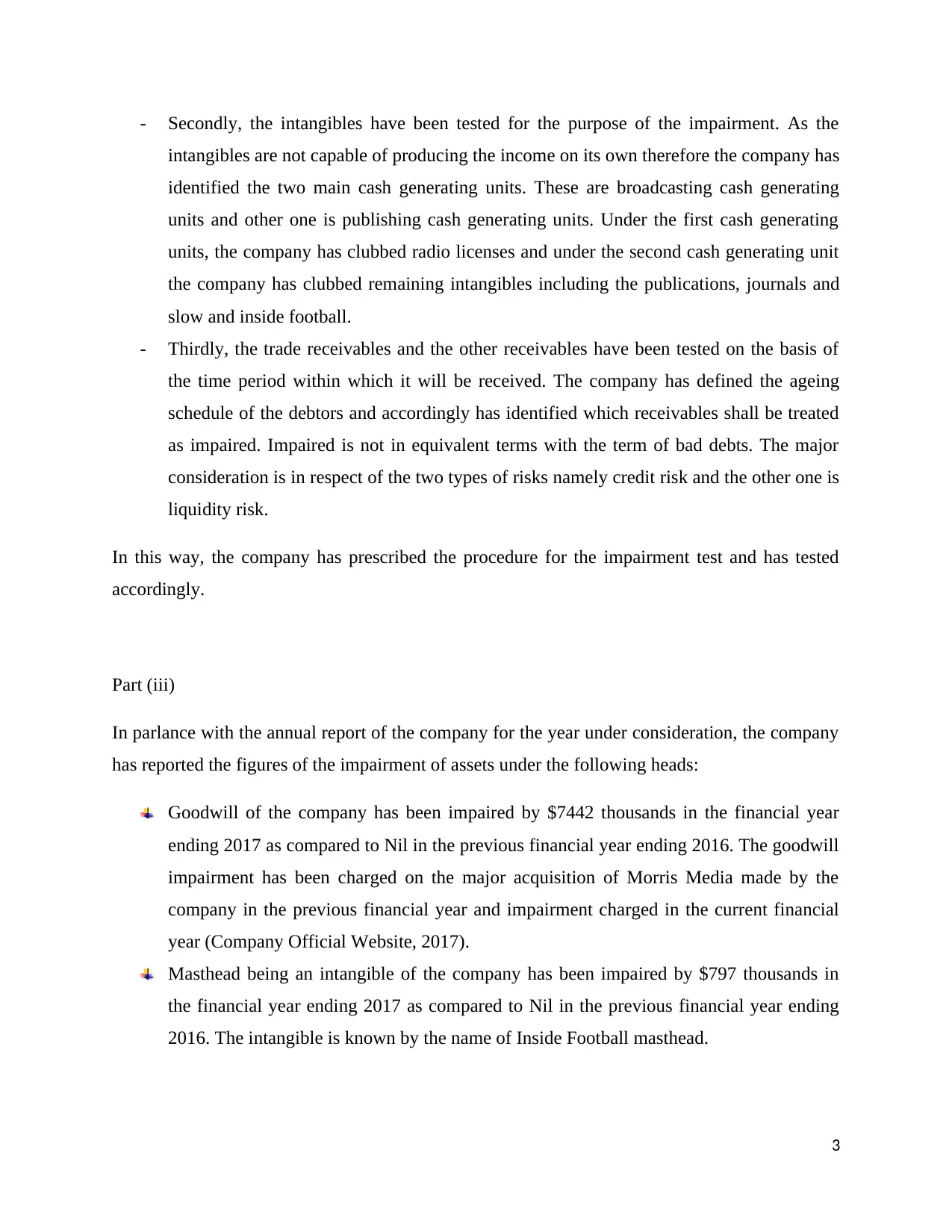
- Secondly, the intangibles have been tested for the purpose of the impairment. As the
intangibles are not capable of producing the income on its own therefore the company has
identified the two main cash generating units. These are broadcasting cash generating
units and other one is publishing cash generating units. Under the first cash generating
units, the company has clubbed radio licenses and under the second cash generating unit
the company has clubbed remaining intangibles including the publications, journals and
slow and inside football.
- Thirdly, the trade receivables and the other receivables have been tested on the basis of
the time period within which it will be received. The company has defined the ageing
schedule of the debtors and accordingly has identified which receivables shall be treated
as impaired. Impaired is not in equivalent terms with the term of bad debts. The major
consideration is in respect of the two types of risks namely credit risk and the other one is
liquidity risk.
In this way, the company has prescribed the procedure for the impairment test and has tested
accordingly.
Part (iii)
In parlance with the annual report of the company for the year under consideration, the company
has reported the figures of the impairment of assets under the following heads:
Goodwill of the company has been impaired by $7442 thousands in the financial year
ending 2017 as compared to Nil in the previous financial year ending 2016. The goodwill
impairment has been charged on the major acquisition of Morris Media made by the
company in the previous financial year and impairment charged in the current financial
year (Company Official Website, 2017).
Masthead being an intangible of the company has been impaired by $797 thousands in
the financial year ending 2017 as compared to Nil in the previous financial year ending
2016. The intangible is known by the name of Inside Football masthead.
3
intangibles are not capable of producing the income on its own therefore the company has
identified the two main cash generating units. These are broadcasting cash generating
units and other one is publishing cash generating units. Under the first cash generating
units, the company has clubbed radio licenses and under the second cash generating unit
the company has clubbed remaining intangibles including the publications, journals and
slow and inside football.
- Thirdly, the trade receivables and the other receivables have been tested on the basis of
the time period within which it will be received. The company has defined the ageing
schedule of the debtors and accordingly has identified which receivables shall be treated
as impaired. Impaired is not in equivalent terms with the term of bad debts. The major
consideration is in respect of the two types of risks namely credit risk and the other one is
liquidity risk.
In this way, the company has prescribed the procedure for the impairment test and has tested
accordingly.
Part (iii)
In parlance with the annual report of the company for the year under consideration, the company
has reported the figures of the impairment of assets under the following heads:
Goodwill of the company has been impaired by $7442 thousands in the financial year
ending 2017 as compared to Nil in the previous financial year ending 2016. The goodwill
impairment has been charged on the major acquisition of Morris Media made by the
company in the previous financial year and impairment charged in the current financial
year (Company Official Website, 2017).
Masthead being an intangible of the company has been impaired by $797 thousands in
the financial year ending 2017 as compared to Nil in the previous financial year ending
2016. The intangible is known by the name of Inside Football masthead.
3
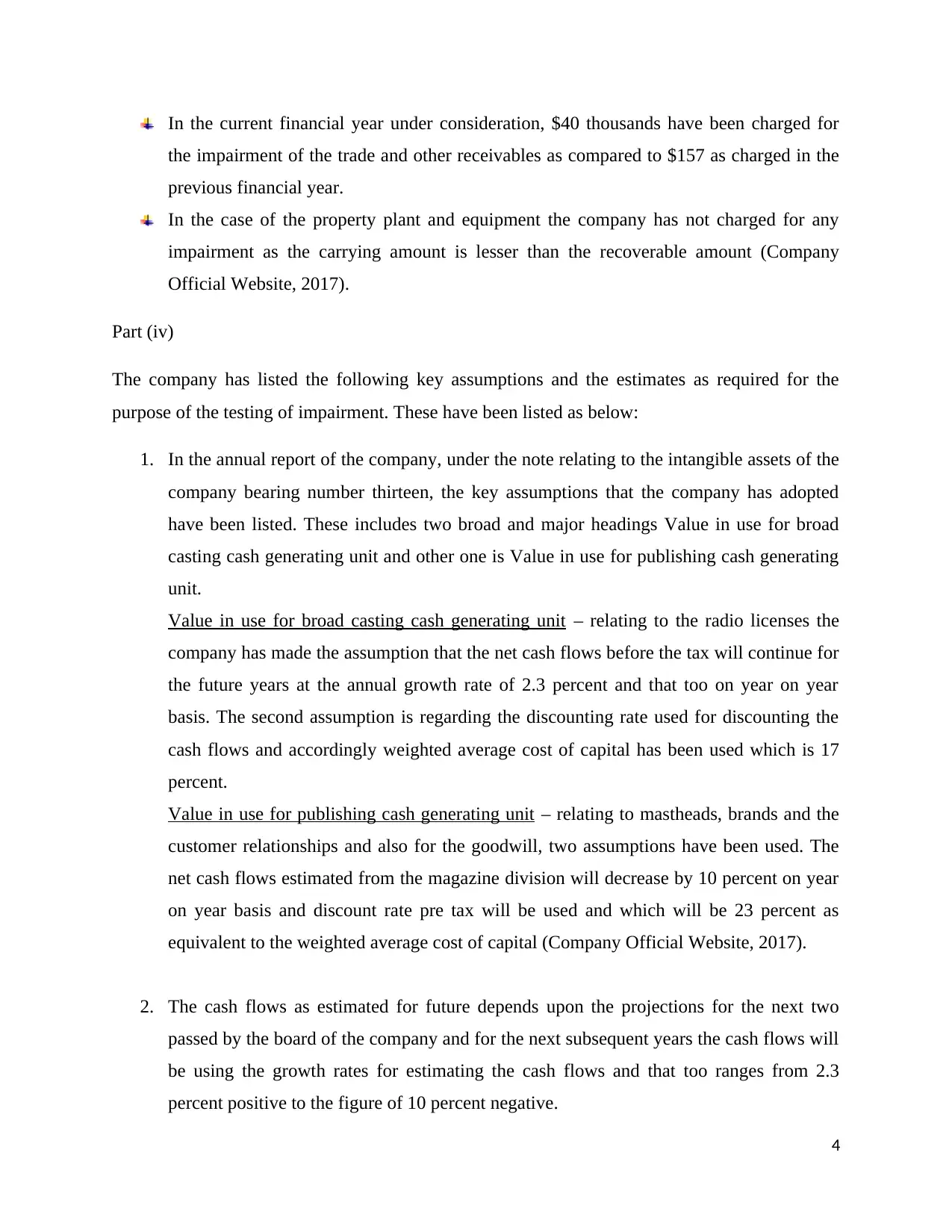
In the current financial year under consideration, $40 thousands have been charged for
the impairment of the trade and other receivables as compared to $157 as charged in the
previous financial year.
In the case of the property plant and equipment the company has not charged for any
impairment as the carrying amount is lesser than the recoverable amount (Company
Official Website, 2017).
Part (iv)
The company has listed the following key assumptions and the estimates as required for the
purpose of the testing of impairment. These have been listed as below:
1. In the annual report of the company, under the note relating to the intangible assets of the
company bearing number thirteen, the key assumptions that the company has adopted
have been listed. These includes two broad and major headings Value in use for broad
casting cash generating unit and other one is Value in use for publishing cash generating
unit.
Value in use for broad casting cash generating unit – relating to the radio licenses the
company has made the assumption that the net cash flows before the tax will continue for
the future years at the annual growth rate of 2.3 percent and that too on year on year
basis. The second assumption is regarding the discounting rate used for discounting the
cash flows and accordingly weighted average cost of capital has been used which is 17
percent.
Value in use for publishing cash generating unit – relating to mastheads, brands and the
customer relationships and also for the goodwill, two assumptions have been used. The
net cash flows estimated from the magazine division will decrease by 10 percent on year
on year basis and discount rate pre tax will be used and which will be 23 percent as
equivalent to the weighted average cost of capital (Company Official Website, 2017).
2. The cash flows as estimated for future depends upon the projections for the next two
passed by the board of the company and for the next subsequent years the cash flows will
be using the growth rates for estimating the cash flows and that too ranges from 2.3
percent positive to the figure of 10 percent negative.
4
the impairment of the trade and other receivables as compared to $157 as charged in the
previous financial year.
In the case of the property plant and equipment the company has not charged for any
impairment as the carrying amount is lesser than the recoverable amount (Company
Official Website, 2017).
Part (iv)
The company has listed the following key assumptions and the estimates as required for the
purpose of the testing of impairment. These have been listed as below:
1. In the annual report of the company, under the note relating to the intangible assets of the
company bearing number thirteen, the key assumptions that the company has adopted
have been listed. These includes two broad and major headings Value in use for broad
casting cash generating unit and other one is Value in use for publishing cash generating
unit.
Value in use for broad casting cash generating unit – relating to the radio licenses the
company has made the assumption that the net cash flows before the tax will continue for
the future years at the annual growth rate of 2.3 percent and that too on year on year
basis. The second assumption is regarding the discounting rate used for discounting the
cash flows and accordingly weighted average cost of capital has been used which is 17
percent.
Value in use for publishing cash generating unit – relating to mastheads, brands and the
customer relationships and also for the goodwill, two assumptions have been used. The
net cash flows estimated from the magazine division will decrease by 10 percent on year
on year basis and discount rate pre tax will be used and which will be 23 percent as
equivalent to the weighted average cost of capital (Company Official Website, 2017).
2. The cash flows as estimated for future depends upon the projections for the next two
passed by the board of the company and for the next subsequent years the cash flows will
be using the growth rates for estimating the cash flows and that too ranges from 2.3
percent positive to the figure of 10 percent negative.
4
Secure Best Marks with AI Grader
Need help grading? Try our AI Grader for instant feedback on your assignments.
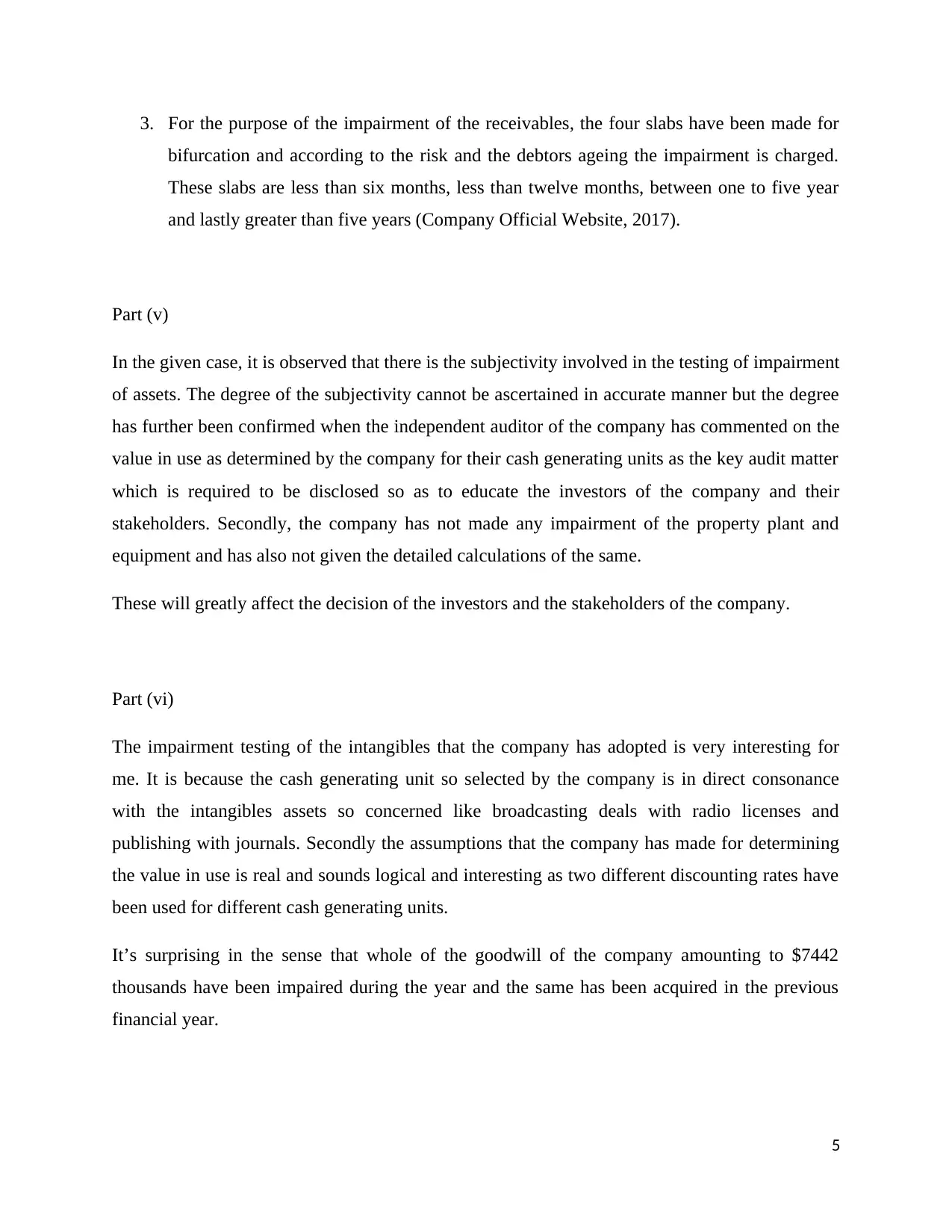
3. For the purpose of the impairment of the receivables, the four slabs have been made for
bifurcation and according to the risk and the debtors ageing the impairment is charged.
These slabs are less than six months, less than twelve months, between one to five year
and lastly greater than five years (Company Official Website, 2017).
Part (v)
In the given case, it is observed that there is the subjectivity involved in the testing of impairment
of assets. The degree of the subjectivity cannot be ascertained in accurate manner but the degree
has further been confirmed when the independent auditor of the company has commented on the
value in use as determined by the company for their cash generating units as the key audit matter
which is required to be disclosed so as to educate the investors of the company and their
stakeholders. Secondly, the company has not made any impairment of the property plant and
equipment and has also not given the detailed calculations of the same.
These will greatly affect the decision of the investors and the stakeholders of the company.
Part (vi)
The impairment testing of the intangibles that the company has adopted is very interesting for
me. It is because the cash generating unit so selected by the company is in direct consonance
with the intangibles assets so concerned like broadcasting deals with radio licenses and
publishing with journals. Secondly the assumptions that the company has made for determining
the value in use is real and sounds logical and interesting as two different discounting rates have
been used for different cash generating units.
It’s surprising in the sense that whole of the goodwill of the company amounting to $7442
thousands have been impaired during the year and the same has been acquired in the previous
financial year.
5
bifurcation and according to the risk and the debtors ageing the impairment is charged.
These slabs are less than six months, less than twelve months, between one to five year
and lastly greater than five years (Company Official Website, 2017).
Part (v)
In the given case, it is observed that there is the subjectivity involved in the testing of impairment
of assets. The degree of the subjectivity cannot be ascertained in accurate manner but the degree
has further been confirmed when the independent auditor of the company has commented on the
value in use as determined by the company for their cash generating units as the key audit matter
which is required to be disclosed so as to educate the investors of the company and their
stakeholders. Secondly, the company has not made any impairment of the property plant and
equipment and has also not given the detailed calculations of the same.
These will greatly affect the decision of the investors and the stakeholders of the company.
Part (vi)
The impairment testing of the intangibles that the company has adopted is very interesting for
me. It is because the cash generating unit so selected by the company is in direct consonance
with the intangibles assets so concerned like broadcasting deals with radio licenses and
publishing with journals. Secondly the assumptions that the company has made for determining
the value in use is real and sounds logical and interesting as two different discounting rates have
been used for different cash generating units.
It’s surprising in the sense that whole of the goodwill of the company amounting to $7442
thousands have been impaired during the year and the same has been acquired in the previous
financial year.
5
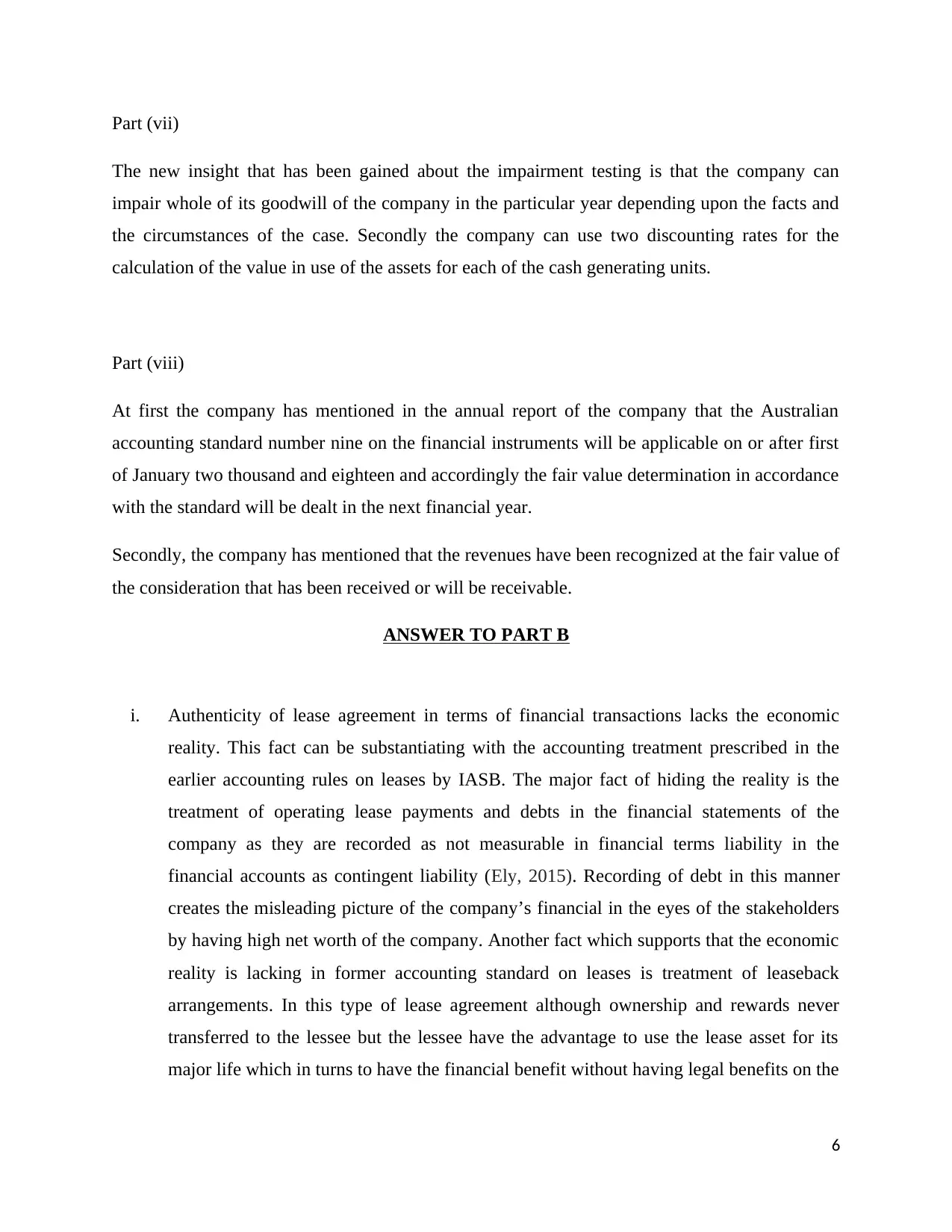
Part (vii)
The new insight that has been gained about the impairment testing is that the company can
impair whole of its goodwill of the company in the particular year depending upon the facts and
the circumstances of the case. Secondly the company can use two discounting rates for the
calculation of the value in use of the assets for each of the cash generating units.
Part (viii)
At first the company has mentioned in the annual report of the company that the Australian
accounting standard number nine on the financial instruments will be applicable on or after first
of January two thousand and eighteen and accordingly the fair value determination in accordance
with the standard will be dealt in the next financial year.
Secondly, the company has mentioned that the revenues have been recognized at the fair value of
the consideration that has been received or will be receivable.
ANSWER TO PART B
i. Authenticity of lease agreement in terms of financial transactions lacks the economic
reality. This fact can be substantiating with the accounting treatment prescribed in the
earlier accounting rules on leases by IASB. The major fact of hiding the reality is the
treatment of operating lease payments and debts in the financial statements of the
company as they are recorded as not measurable in financial terms liability in the
financial accounts as contingent liability (Ely, 2015). Recording of debt in this manner
creates the misleading picture of the company’s financial in the eyes of the stakeholders
by having high net worth of the company. Another fact which supports that the economic
reality is lacking in former accounting standard on leases is treatment of leaseback
arrangements. In this type of lease agreement although ownership and rewards never
transferred to the lessee but the lessee have the advantage to use the lease asset for its
major life which in turns to have the financial benefit without having legal benefits on the
6
The new insight that has been gained about the impairment testing is that the company can
impair whole of its goodwill of the company in the particular year depending upon the facts and
the circumstances of the case. Secondly the company can use two discounting rates for the
calculation of the value in use of the assets for each of the cash generating units.
Part (viii)
At first the company has mentioned in the annual report of the company that the Australian
accounting standard number nine on the financial instruments will be applicable on or after first
of January two thousand and eighteen and accordingly the fair value determination in accordance
with the standard will be dealt in the next financial year.
Secondly, the company has mentioned that the revenues have been recognized at the fair value of
the consideration that has been received or will be receivable.
ANSWER TO PART B
i. Authenticity of lease agreement in terms of financial transactions lacks the economic
reality. This fact can be substantiating with the accounting treatment prescribed in the
earlier accounting rules on leases by IASB. The major fact of hiding the reality is the
treatment of operating lease payments and debts in the financial statements of the
company as they are recorded as not measurable in financial terms liability in the
financial accounts as contingent liability (Ely, 2015). Recording of debt in this manner
creates the misleading picture of the company’s financial in the eyes of the stakeholders
by having high net worth of the company. Another fact which supports that the economic
reality is lacking in former accounting standard on leases is treatment of leaseback
arrangements. In this type of lease agreement although ownership and rewards never
transferred to the lessee but the lessee have the advantage to use the lease asset for its
major life which in turns to have the financial benefit without having legal benefits on the
6
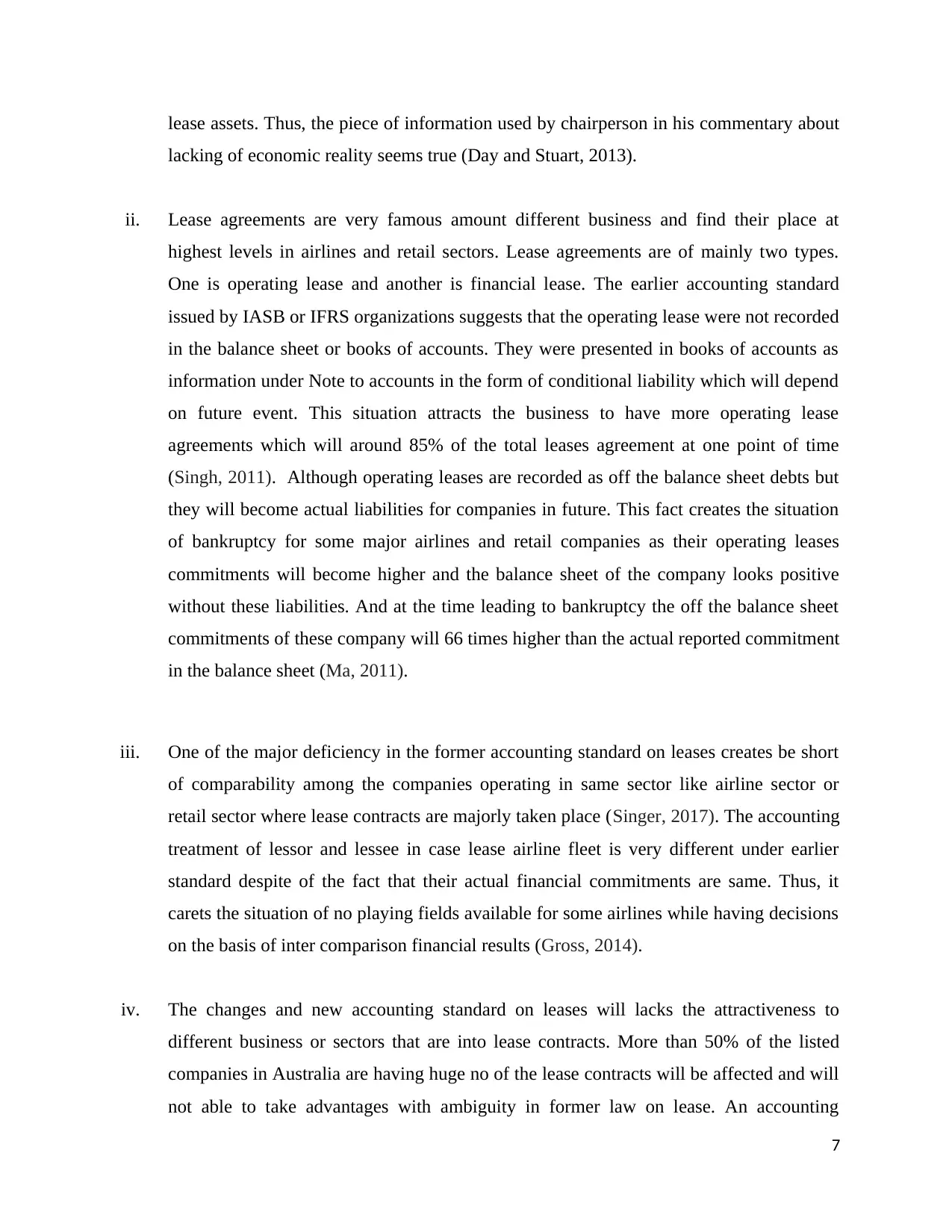
lease assets. Thus, the piece of information used by chairperson in his commentary about
lacking of economic reality seems true (Day and Stuart, 2013).
ii. Lease agreements are very famous amount different business and find their place at
highest levels in airlines and retail sectors. Lease agreements are of mainly two types.
One is operating lease and another is financial lease. The earlier accounting standard
issued by IASB or IFRS organizations suggests that the operating lease were not recorded
in the balance sheet or books of accounts. They were presented in books of accounts as
information under Note to accounts in the form of conditional liability which will depend
on future event. This situation attracts the business to have more operating lease
agreements which will around 85% of the total leases agreement at one point of time
(Singh, 2011). Although operating leases are recorded as off the balance sheet debts but
they will become actual liabilities for companies in future. This fact creates the situation
of bankruptcy for some major airlines and retail companies as their operating leases
commitments will become higher and the balance sheet of the company looks positive
without these liabilities. And at the time leading to bankruptcy the off the balance sheet
commitments of these company will 66 times higher than the actual reported commitment
in the balance sheet (Ma, 2011).
iii. One of the major deficiency in the former accounting standard on leases creates be short
of comparability among the companies operating in same sector like airline sector or
retail sector where lease contracts are majorly taken place (Singer, 2017). The accounting
treatment of lessor and lessee in case lease airline fleet is very different under earlier
standard despite of the fact that their actual financial commitments are same. Thus, it
carets the situation of no playing fields available for some airlines while having decisions
on the basis of inter comparison financial results (Gross, 2014).
iv. The changes and new accounting standard on leases will lacks the attractiveness to
different business or sectors that are into lease contracts. More than 50% of the listed
companies in Australia are having huge no of the lease contracts will be affected and will
not able to take advantages with ambiguity in former law on lease. An accounting
7
lacking of economic reality seems true (Day and Stuart, 2013).
ii. Lease agreements are very famous amount different business and find their place at
highest levels in airlines and retail sectors. Lease agreements are of mainly two types.
One is operating lease and another is financial lease. The earlier accounting standard
issued by IASB or IFRS organizations suggests that the operating lease were not recorded
in the balance sheet or books of accounts. They were presented in books of accounts as
information under Note to accounts in the form of conditional liability which will depend
on future event. This situation attracts the business to have more operating lease
agreements which will around 85% of the total leases agreement at one point of time
(Singh, 2011). Although operating leases are recorded as off the balance sheet debts but
they will become actual liabilities for companies in future. This fact creates the situation
of bankruptcy for some major airlines and retail companies as their operating leases
commitments will become higher and the balance sheet of the company looks positive
without these liabilities. And at the time leading to bankruptcy the off the balance sheet
commitments of these company will 66 times higher than the actual reported commitment
in the balance sheet (Ma, 2011).
iii. One of the major deficiency in the former accounting standard on leases creates be short
of comparability among the companies operating in same sector like airline sector or
retail sector where lease contracts are majorly taken place (Singer, 2017). The accounting
treatment of lessor and lessee in case lease airline fleet is very different under earlier
standard despite of the fact that their actual financial commitments are same. Thus, it
carets the situation of no playing fields available for some airlines while having decisions
on the basis of inter comparison financial results (Gross, 2014).
iv. The changes and new accounting standard on leases will lacks the attractiveness to
different business or sectors that are into lease contracts. More than 50% of the listed
companies in Australia are having huge no of the lease contracts will be affected and will
not able to take advantages with ambiguity in former law on lease. An accounting
7
Paraphrase This Document
Need a fresh take? Get an instant paraphrase of this document with our AI Paraphraser
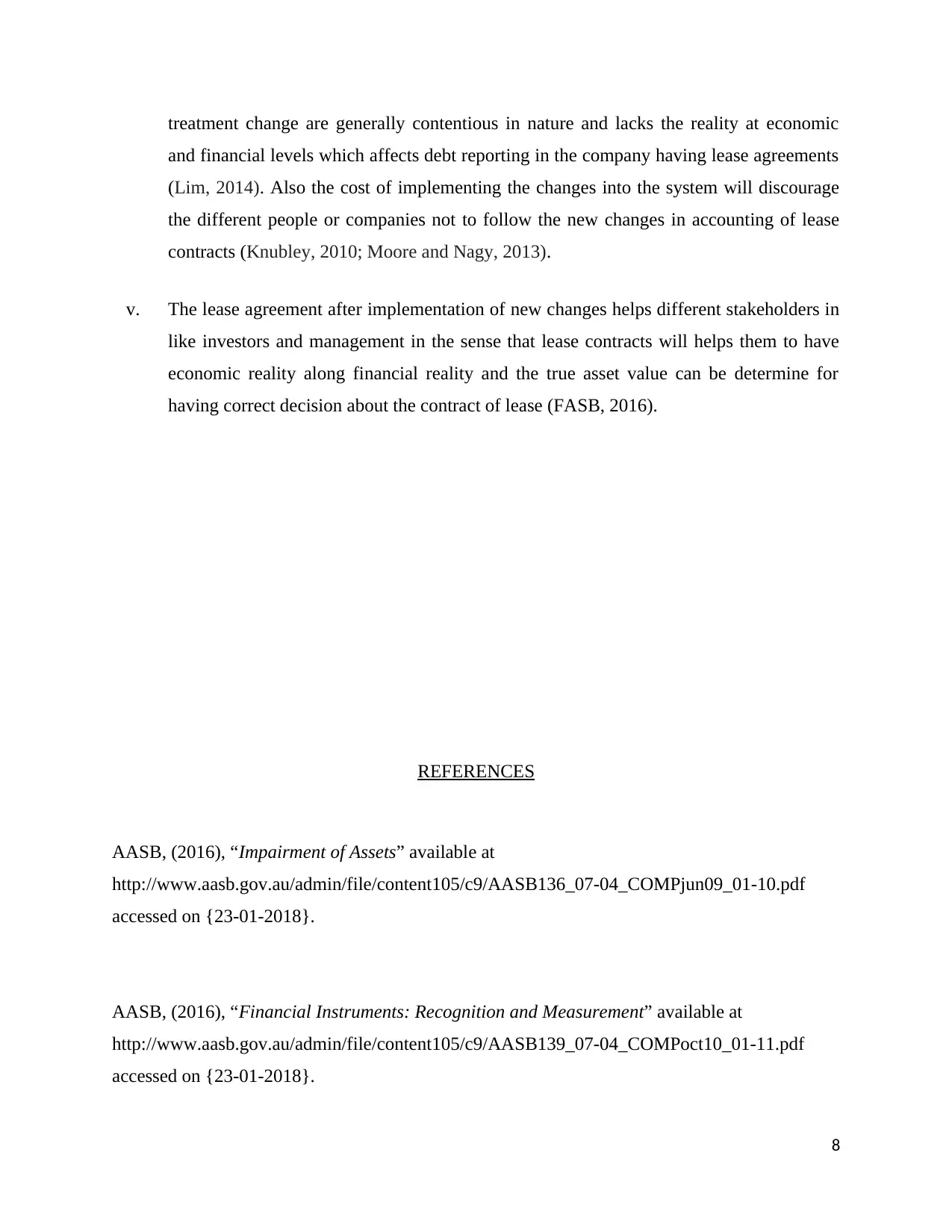
treatment change are generally contentious in nature and lacks the reality at economic
and financial levels which affects debt reporting in the company having lease agreements
(Lim, 2014). Also the cost of implementing the changes into the system will discourage
the different people or companies not to follow the new changes in accounting of lease
contracts (Knubley, 2010; Moore and Nagy, 2013).
v. The lease agreement after implementation of new changes helps different stakeholders in
like investors and management in the sense that lease contracts will helps them to have
economic reality along financial reality and the true asset value can be determine for
having correct decision about the contract of lease (FASB, 2016).
REFERENCES
AASB, (2016), “Impairment of Assets” available at
http://www.aasb.gov.au/admin/file/content105/c9/AASB136_07-04_COMPjun09_01-10.pdf
accessed on {23-01-2018}.
AASB, (2016), “Financial Instruments: Recognition and Measurement” available at
http://www.aasb.gov.au/admin/file/content105/c9/AASB139_07-04_COMPoct10_01-11.pdf
accessed on {23-01-2018}.
8
and financial levels which affects debt reporting in the company having lease agreements
(Lim, 2014). Also the cost of implementing the changes into the system will discourage
the different people or companies not to follow the new changes in accounting of lease
contracts (Knubley, 2010; Moore and Nagy, 2013).
v. The lease agreement after implementation of new changes helps different stakeholders in
like investors and management in the sense that lease contracts will helps them to have
economic reality along financial reality and the true asset value can be determine for
having correct decision about the contract of lease (FASB, 2016).
REFERENCES
AASB, (2016), “Impairment of Assets” available at
http://www.aasb.gov.au/admin/file/content105/c9/AASB136_07-04_COMPjun09_01-10.pdf
accessed on {23-01-2018}.
AASB, (2016), “Financial Instruments: Recognition and Measurement” available at
http://www.aasb.gov.au/admin/file/content105/c9/AASB139_07-04_COMPoct10_01-11.pdf
accessed on {23-01-2018}.
8
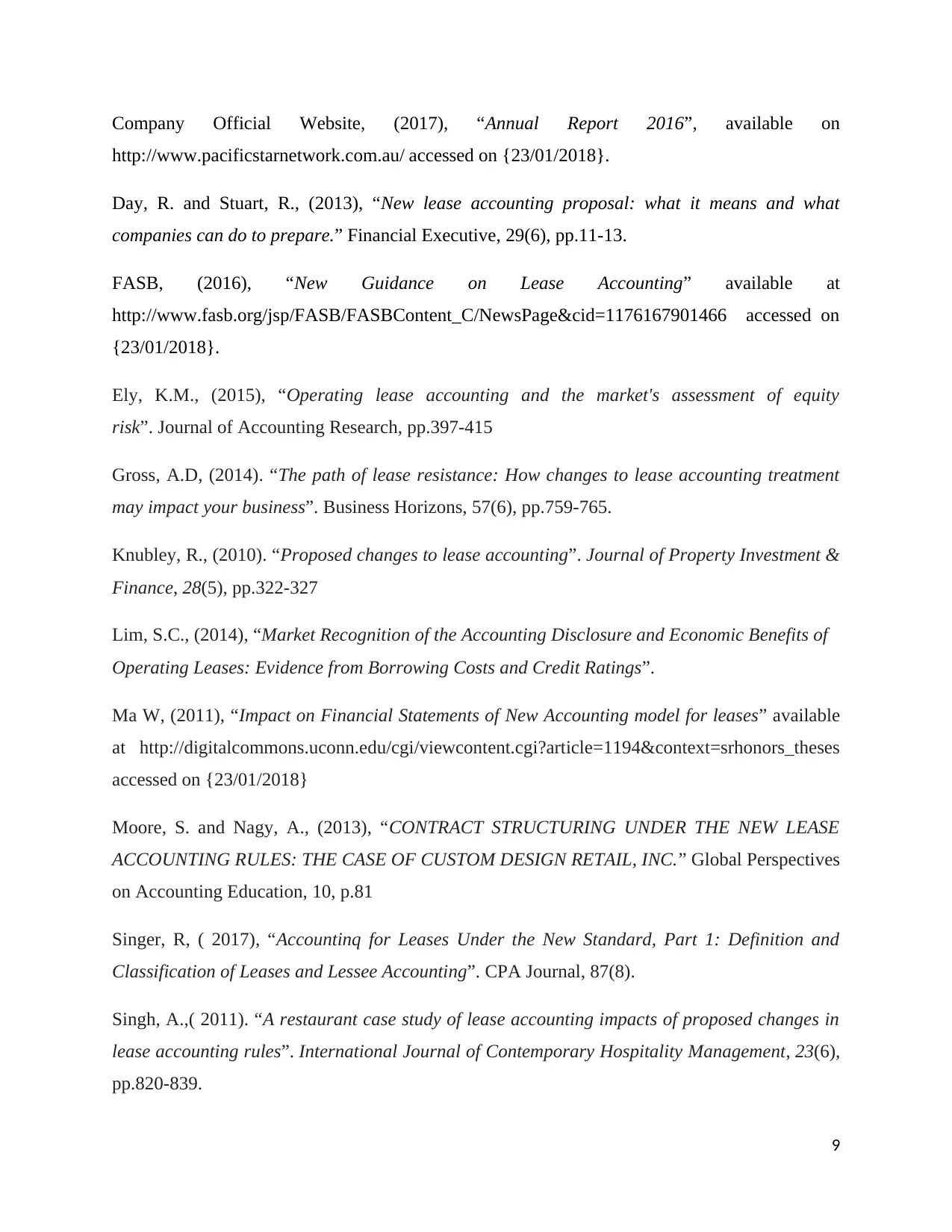
Company Official Website, (2017), “Annual Report 2016”, available on
http://www.pacificstarnetwork.com.au/ accessed on {23/01/2018}.
Day, R. and Stuart, R., (2013), “New lease accounting proposal: what it means and what
companies can do to prepare.” Financial Executive, 29(6), pp.11-13.
FASB, (2016), “New Guidance on Lease Accounting” available at
http://www.fasb.org/jsp/FASB/FASBContent_C/NewsPage&cid=1176167901466 accessed on
{23/01/2018}.
Ely, K.M., (2015), “Operating lease accounting and the market's assessment of equity
risk”. Journal of Accounting Research, pp.397-415
Gross, A.D, (2014). “The path of lease resistance: How changes to lease accounting treatment
may impact your business”. Business Horizons, 57(6), pp.759-765.
Knubley, R., (2010). “Proposed changes to lease accounting”. Journal of Property Investment &
Finance, 28(5), pp.322-327
Lim, S.C., (2014), “Market Recognition of the Accounting Disclosure and Economic Benefits of
Operating Leases: Evidence from Borrowing Costs and Credit Ratings”.
Ma W, (2011), “Impact on Financial Statements of New Accounting model for leases” available
at http://digitalcommons.uconn.edu/cgi/viewcontent.cgi?article=1194&context=srhonors_theses
accessed on {23/01/2018}
Moore, S. and Nagy, A., (2013), “CONTRACT STRUCTURING UNDER THE NEW LEASE
ACCOUNTING RULES: THE CASE OF CUSTOM DESIGN RETAIL, INC.” Global Perspectives
on Accounting Education, 10, p.81
Singer, R, ( 2017), “Accountinq for Leases Under the New Standard, Part 1: Definition and
Classification of Leases and Lessee Accounting”. CPA Journal, 87(8).
Singh, A.,( 2011). “A restaurant case study of lease accounting impacts of proposed changes in
lease accounting rules”. International Journal of Contemporary Hospitality Management, 23(6),
pp.820-839.
9
http://www.pacificstarnetwork.com.au/ accessed on {23/01/2018}.
Day, R. and Stuart, R., (2013), “New lease accounting proposal: what it means and what
companies can do to prepare.” Financial Executive, 29(6), pp.11-13.
FASB, (2016), “New Guidance on Lease Accounting” available at
http://www.fasb.org/jsp/FASB/FASBContent_C/NewsPage&cid=1176167901466 accessed on
{23/01/2018}.
Ely, K.M., (2015), “Operating lease accounting and the market's assessment of equity
risk”. Journal of Accounting Research, pp.397-415
Gross, A.D, (2014). “The path of lease resistance: How changes to lease accounting treatment
may impact your business”. Business Horizons, 57(6), pp.759-765.
Knubley, R., (2010). “Proposed changes to lease accounting”. Journal of Property Investment &
Finance, 28(5), pp.322-327
Lim, S.C., (2014), “Market Recognition of the Accounting Disclosure and Economic Benefits of
Operating Leases: Evidence from Borrowing Costs and Credit Ratings”.
Ma W, (2011), “Impact on Financial Statements of New Accounting model for leases” available
at http://digitalcommons.uconn.edu/cgi/viewcontent.cgi?article=1194&context=srhonors_theses
accessed on {23/01/2018}
Moore, S. and Nagy, A., (2013), “CONTRACT STRUCTURING UNDER THE NEW LEASE
ACCOUNTING RULES: THE CASE OF CUSTOM DESIGN RETAIL, INC.” Global Perspectives
on Accounting Education, 10, p.81
Singer, R, ( 2017), “Accountinq for Leases Under the New Standard, Part 1: Definition and
Classification of Leases and Lessee Accounting”. CPA Journal, 87(8).
Singh, A.,( 2011). “A restaurant case study of lease accounting impacts of proposed changes in
lease accounting rules”. International Journal of Contemporary Hospitality Management, 23(6),
pp.820-839.
9

10
1 out of 10
Related Documents
Your All-in-One AI-Powered Toolkit for Academic Success.
+13062052269
info@desklib.com
Available 24*7 on WhatsApp / Email
![[object Object]](/_next/static/media/star-bottom.7253800d.svg)
Unlock your academic potential
© 2024 | Zucol Services PVT LTD | All rights reserved.





